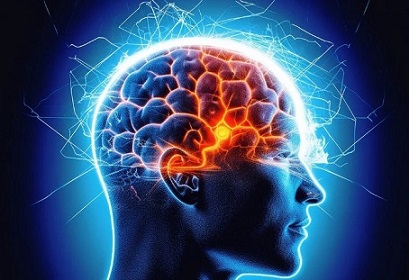Single-Cell RNA Sequencing Analysis Shows That SARS-CoV-2 Is Linked To Increased Risk Of Mania And Epilepsy!
Nikhil Prasad Fact checked by:Thailand Medical News Team Feb 11, 2024 1 year, 11 months, 3 weeks, 6 days, 14 hours, 13 minutes ago
COVID-19 News: As the global impact of Coronavirus Disease 2019 (COVID-19) caused by severe acute respiratory syndrome coronavirus 2 (SARS-CoV-2) continues to unfold, a growing body of evidence suggests that the repercussions extend beyond the respiratory system. Recent studies have raised concerns about the potential association between SARS-CoV-2 infection and an increased risk of neurological diseases. The intricate relationship between COVID-19 and neurological disorders prompts a need for in-depth investigations to discern the causal links and understand the underlying mechanisms. In this
COVID-19 News report, we delve into a groundbreaking study conducted at Chongqing Medical University, China, employing advanced methodologies such as Mendelian randomization (MR) analysis and single-cell RNA sequencing (scRNA-seq) to shed light on the connections between SARS-CoV-2 and neurological disorders.
 Single-Cell RNA Sequencing Analysis Shows That SARS-CoV-2
Single-Cell RNA Sequencing Analysis Shows That SARS-CoV-2
Is Linked To Increased Risk Of Mania And Epilepsy!
Understanding the Landscape
With over 700 million infections and 7 million deaths reported globally, COVID-19 has emerged as a significant public health crisis. Initially perceived as primarily impacting the respiratory system, the virus's influence on the central and peripheral nervous systems has become increasingly apparent. Neurological manifestations associated with COVID-19 can be categorized into various disorders, including those affecting the central nervous system, peripheral nervous system, muscular system, and altered mental status. Recognizing the potential impact on neurological health, researchers at Chongqing Medical University aimed to unravel the complex relationships between SARS-CoV-2 infections and specific neurological diseases.
Methods Employed for In-Depth Analysis
The study utilized two key methodologies to scrutinize the association between COVID-19 and neurological disorders - Mendelian randomization (MR) analysis and single-cell RNA sequencing (scRNA-seq).
Mendelian randomization is a robust analytical approach that employs genetic variation as a proxy to examine the potential causal effect of an exposure, in this case, COVID-19, on specific outcomes, such as neurological disorders. By utilizing the CAUSE method, the researchers sought to minimize confounding bias and assess causal relationships between SARS-CoV-2 infections and neurological diseases.
To gain insights into potential neuroinvasion routes and cellular responses to SARS-CoV-2, scRNA-seq analysis was performed on samples obtained from the temporal cortex of epilepsy patients and control subjects. This cutting-edge technique allowed the researchers to identify distinct cell subtypes, measure SARS-CoV-2 receptor expression, and conduct fast gene set enrichment analysis (fGSEA) to assess disease-related pathways.
Key Findings
The MR analysis revealed a causal association between COVID-19 and an increased risk of manic and epilepsy. These findings align with epidemiological studies rep
orting similar associations between COVID-19 and neurological disorders, emphasizing the need for further investigation.
ScRNA-seq analysis identified 23 distinct cell subtypes related to epilepsy, with the SARS-CoV-2 receptor TTYH2 specifically expressed in oligodendrocyte and astrocyte cell subtypes. Further analysis through fGSEA highlighted the association of these receptor-specific cell subtypes with methylation of lysine 27 on histone H3 (H3K27ME3), neuronal system, aging brain, neurogenesis, and neuron projection.
Discussion and Implications
The study's findings provide compelling evidence of the causal links between SARS-CoV-2 infections and specific neurological disorders, particularly epilepsy and manic symptoms. The scRNA-seq data offer valuable insights into the cell subtypes involved and potential pathways implicated in the pathogenesis of these disorders.
Clinical studies have previously suggested a connection between COVID-19 and neurological manifestations, including manic and epilepsy symptoms. The MR results in this study support and strengthen these observations, emphasizing the importance of considering neurological complications in the care of COVID-19 patients.
The identification of TTYH2, a receptor implicated in epilepsy, raises intriguing possibilities for targeted interventions. Understanding the specific cell types and pathways involved in the interaction between SARS-CoV-2 and neurological receptors may pave the way for early interventions and treatments tailored to address the unique aspects of these disorders.
Limitations and Future Directions
While this study provides valuable insights, it is essential to acknowledge its limitations. The predominantly European ancestry of the populations analyzed may limit the generalization of findings to other populations. Additionally, the study relies on modeling assumptions inherent in MR analysis, emphasizing the need for well-powered randomized trials to conclusively assess the associations.
Future research directions should explore the underlying mechanisms linking COVID-19 with neurological diseases, including manic and epilepsy symptoms. Further investigations into the potential therapeutic targets identified through scRNA-seq and fGSEA analyses can offer new avenues for intervention and treatment strategies.
Conclusion
In conclusion, the study from Chongqing Medical University contributes significantly to our understanding of the complex interplay between SARS-CoV-2 infections and neurological disorders. The combination of MR analysis and scRNA-seq techniques unraveled causal associations, identified specific cell subtypes, and highlighted potential pathways involved in the pathogenesis of epilepsy and manic symptoms. This knowledge is crucial for guiding future research, public health measures, and early interventions to mitigate the neurological impact of COVID-19. As the world continues to grapple with the ongoing pandemic, a deeper understanding of the intricate relationships between viral infections and neurological health is paramount for effective prevention and treatment strategies.
The study findings were published in the peer reviewed journal: Molecular Neurobiology (Springer).
https://link.springer.com/article/10.1007/s12035-024-03975-2
For the latest
COVID-19 News, keep on logging to Thailand Medical News.
